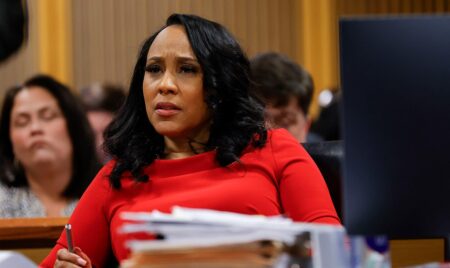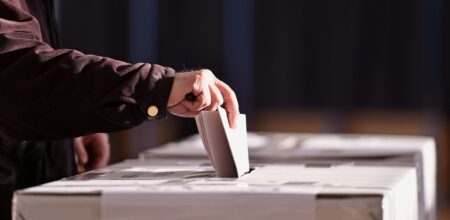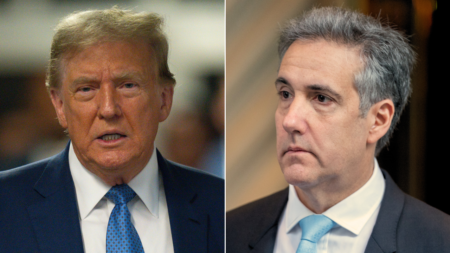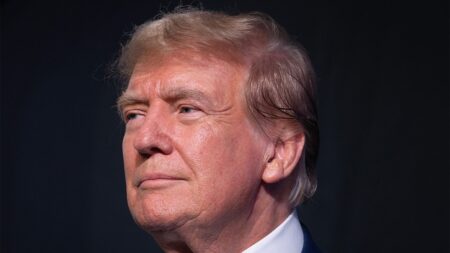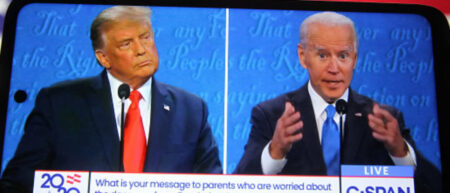A version of this story appeared in CNN’s What Matters newsletter. To get it in your inbox, sign up for free here.
Voters and economists seem to have wildly different views of the US economy, a disconnect that’s hurting President Joe Biden in the key states that will decide the 2024 election.
There’s new polling from The Wall Street Journal that outlines the dichotomy and the challenge it represents for Biden in particular as memories of the Donald Trump years fade.
Swing state voters, according to the Journal, are more focused on the economy and inflation than those nationwide, and they also have a dimmer view of the state of the country.
Just one-quarter of registered voters in these seven key states – Arizona, Georgia, Michigan, North Carolina, Nevada, Pennsylvania and Wisconsin – say the economy has improved in the past two years. The economic data, on the other hand, suggests inflation is cooling and the US seems likely to avoid a recession that seemed likely a year ago. The soft landing happened without even spiking the unemployment rate, which was a real fear.
“A relatively strong economy” is how Larry Summers, the former Treasury secretary, described it last month. For context, Summers was early to raise the alarm about the threat of inflation after the Covid-19 pandemic, and he has loudly criticized the Biden administration and the Federal Reserve for most of Biden’s term.
The disconnect runs much deeper than a misalignment of voters’ perceptions and economic indicators. About half of these voters think their own economic situation is fine, and they might rate their individual states as positive. The national economy, however, gets a bad rating.
From the Journal:
In North Carolina, for example, voters describe the national economy in negative rather than positive terms by 66% to 33%. Yet those numbers are reversed when asked to rate the state’s economy. In Wisconsin, negative views of the national economy outweigh positive ones by 16 points, while positive views of the state economy outweigh negative ones by 17 points.
Across these battleground states, 46% of registered voters said their personal financial situation is headed in the right direction.
The divide between Americans’ views of their personal finances and their broader economic sentiments isn’t new. CNN’s polling editor Ariel Edwards-Levy pointed me to Gallup polling from last April in which just 16% rated the economy as good or excellent, but 45% said their personal finances were good or excellent. (Perceptions of the economy have improved modestly in the intervening year.)
Edwards-Levy also noted that partisanship can play a role in even seemingly non-political questions about the state of the nation.
“People’s answers to surveys are often intended at least partially as an expression of partisan support or opposition,” she said, adding that is “compounded when talking about broad national trends.”
It’s also true that while people might say in a survey that their financial situation is fine, there are indications that they also feel unable to keep up.
Just read CNN’s reporting about tenants who can’t afford to pay their rents, the barriers to home ownership that are compounded on racial minorities or the issue with 401(k) balances.
Stock markets may have repeatedly set records this year, making people with investments feel flush, but only about a quarter of registered voters across the swing states surveyed by the Journal said the ability for the average person to get ahead is moving in the right direction in the US.
Biden’s task with this election cycle will be to convince these voters that their personal and state situation is writ large in the country too.
As it stands, roughly half or more of registered voters in all of the swing states in the new Wall Street Journal poll say Trump is the candidate best able to handle the key issues of the economy, inflation and immigration.
Biden’s supporters say the public will come around as the election nears.
“You know what, once people start to focus in, and they see their two choices, it’s obvious that Joe will win this election,” first lady Jill Biden said on CBS on Wednesday morning.
She disputed the Journal poll, which shows Trump holding a small lead in Arizona and North Carolina and matchups within the margin of error in the other five states. When potential independent or third-party candidates like Robert F. Kennedy Jr. are added to the question, Trump still leads by a narrow margin in Arizona and North Carolina, with no clear leader in the other states.
“He’s coming up,” Jill Biden said of the president, indicating he would rise in polls.
It’s certainly true that there’s a lot of campaigning left to do and a lot of time for developments between now and November.
On Wednesday, the president joined the progressive, independent Sen. Bernie Sanders of Vermont at the White House to brag about Democrats’ efforts to contain prescription drug prices.
Biden said that by allowing Medicare to negotiate for certain prescription drugs, he and Sanders “beat Big Pharma finally.” Insulin is now capped at $35 for Medicare enrollees, for instance.
Most voters probably haven’t yet gotten the message about beating Big Pharma. More than half of US adults nationwide said they worry about being able to afford prescription drugs, according to a KFF poll released in February.
George W. Bush’s favorability rating was an objectively abysmal 35% when he left office in January 2009, according to CNN polling at the time. Nine years later, as Americans lived through the next Republican presidency – Trump’s – Bush’s favorability rating had completely rebounded. With the Iraq War and the Great Recession in the rearview mirror – and with Bush, unlike Trump, out of politics – 61% of Americans had a favorable view of him.
Trump’s approval rating may have partially rebounded even though he is still very much in the political mix. More than half the country thought Trump should be removed from office after the January 6, 2021, insurrection, according to CNN polling at the time. His approval rating was just 34%. In the years since, as the shock of the attack on the US Capitol has faded and voters came to associate Biden with the White House and the trying years of the pandemic, views of Trump in hindsight have improved.
Now, more than half of registered voters in the Wall Street Journal poll of battleground states said they either strongly or somewhat approve of the job Trump did as president. That blur of hindsight is a huge advantage for Trump. Just 38% of registered voters in the Journal poll said they either strongly or somewhat approve of the job Biden is doing as president.
Biden is neck-and-neck with Trump among registered voters in those seven swing states on the question of protecting democracy. That should stun the White House since Biden has made protecting democracy, both in the US and abroad, the central tenet of his entire presidency.
Read the full article here



